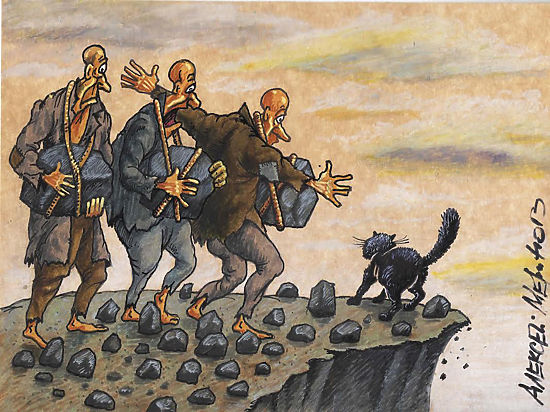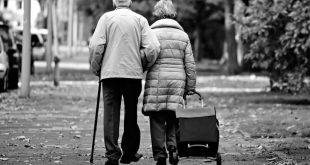They are just used to the stability — and again forced to give up a lot

Photo: RIA Novosti
The number of poor in the country continues to grow: in the first quarter of 2016, according to Rosstat, 22.7 million people in the country had an income below subsistence level (compared to 14.4 million at the end of 2015). The real poverty we’re talking often. Less discussed is the question of how the crisis has hit the representatives of the Russian middle class, which is not yet faced with an empty fridge, but have been forced to abandon their traditional way of life. For many of the young educated professionals living in the capitals and major cities, the last two years were a new experience: in terms of the depreciation of the ruble, falling real incomes and job cuts, they also have to constantly save. About their difficulties to tell in our society it is not accepted, so at the request of the heroes we have changed their names.
“After the decree the crisis is over”
Catherine Likhovskoy lives in Moscow with her husband and son. A year ago, the family has applied for a mortgage at 14% per annum and paid to the Bank approximately one third of total monthly income. Likhovskoy consider themselves middle class, but to live as freely as a few years ago, they have not obtained.
— My work in the field of IT is connected with the implementation of SAP HR, it is more or less stable. But my husband had problems: car service where he works, is engaged in realization of foreign dyes and foreign equipment, and now sales have dropped, which has affected the salary, and company policy terms of cuts in social benefits, which accrued over labor legislation: insurance for employees, gifts for children, payment of mobile communication, payment power, drinking water in the office. All now save.
Confidence in the future we have, that is our country. Where to go see the President, and develops in the direction of agriculture means tractors produce pasuda fields, greenhouses built. Interest in IT is, but current projects have been started before the crisis, the launch of the new I do not expect. Or old will be optimized, or there will be a slight improvement. From the point of view of the economic situation, obviously, no stability did not return, this state is now maintained artificially, so the people quietly went to the polls and voted without panic. But then again… we will see how one day the dollar appreciates by 5 rubles and 3 drops.
Reductions in the work we now do not wait. Have been fired by only those who wanted to fire — we have about 20% of the state. Some women, as soon as the crisis began, became pregnant. Even those who are not going, one after one: while on maternity leave, maybe the crisis is over. People are obviously hedging their bets to keep their place. Often second children, planned a year or two, and on the background of the crisis, apparently decided to accelerate.
We took a mortgage in the midst of crisis, because there was no other choice and the ability to wait. Then it gets worse: new construction freeze, the construction company went bankrupt. When there is no new housing, “secondary housing” has become very expensive, and will be even more expensive. A favorable interest rate on a mortgage in a new building there, but in fact Rob you before this moment: taking money for booking the apartment for the preparation of the documents for the new building about 100 thousand, plus the fee to ennoble the area around. And I couldn’t refuse, otherwise you will not get an apartment.
In the end, we bought on the secondary market two-under 14% annual for 20 years and paid every month about half my wages. It was a lot of stress, but to live in a rented, too expensive, need to pay the realtor about 50 thousand quest for collateral. You depend on the owner, if something happens, it must be sought again and again to pay the realtor. In addition, in Moscow rent or “grandma’s version” for 40 thousand or repair of 60-70 thousand in a month.
And now we are in your homes, made budget repair: bought the same Wallpaper in all the rooms for debris, spread a carpet and ceilings whitewashed. About 70 thousand at all spent.
We save that many products became more expensive or disappeared. Cheese, such as Parmesan, cost 200-300 rubles, we took a piece without hesitation, now it costs 500-600 rubles. This cost is gone from our budget. And still about 30% the costs have increased. Allowed myself a TV and a sofa to buy in installments. Even rose hotel: we had a rest in Turkey and Egypt, we were satisfied with the level of service. For 150 Grand you could go and more wallet does not get it, now on the background of the terrorist threat we went to Greece for the same amount and had to pay extra for everything from towels to ice cream and water.
To afford the excess we can’t, but you do not want. When you know that this thing was worth 12-15 thousand, and now is 30-40, you’re already taking a time-out, a year or two without live. But due to the fact that was the so-called fat years without a mortgage and with a large income, there are two pairs of boots, two down and so on. Maybe we would have changed the car, but while you can five years to wait and save slowly. I think the culture has changed. All complain that the more expensive products and decreased quality, but people used to buy more and could afford to throw out spoiled bananas, or grapes to forget in the fridge. Now we choose carefully.
“We had never looked at the prices at the grocery”
Danil Ivanov lives with his wife in Saint-Petersburg and works as a realtor in one of agencies of real estate in his free time engaged in part-time job. The crisis has affected a young family, but despite this, revenues even increased slightly. The drop in the standard of living of the middle class Daniel connects not only with economic difficulties, but also with the situation in Russia in General.
— If the economy grew, as in Saudi Arabia, the middle class is still not formed like it happens in developed countries where it is 60-70%. Who now support the government? Mostly villages and small towns, retirees and state employees. Because crisis or no crisis, the middle class for the current government — disadvantage: these people will not vote for the current authorities.
If we talk about the effect of the crisis, for example, expensive cars or plane tickets — and so at the hearing. The atmosphere life has changed for the worse. People do not believe in Russia’s future. The country has not come of the investment, does not create high-tech jobs. The middle class is not growing, on the contrary, many are leaving.
I partially adapted to the current situation. I’ve never looked at prices in grocery stores. Now look. Before I could come to the store and buy any phone, I now long to choose, in the end spend the same amount. Some products like, brie cheese, not sold. Red fish 450 rubles, I’m not ready to buy. And of course there’s the problem with traveling abroad. We would like to fly in December in US at St. Herman’s Orthodox youth forum in Washington. Hoard money, but in the end do not know can or not. Very expensive tickets.
Maybe the only positive side of the crisis, in my experience, people have less to borrow and it makes more sense to spend the money. For example, I sold an old laptop for 9 thousand and I collected the money desktop computer is twice as powerful. Parts are cheap, so it is beneficial and interesting. But I have friends in Germany and the United States. They are also very frugal, they are all designed, painted, though, by our standards, they earn a lot. We just have not learned how to spend. Of course, the ruble fell 2 times, but you can buy a phone for 20 thousand and not over 40.
Our economy — the real estate develops steadily. The growth rate last year was a record, despite the crisis. Those who need flat to buy, and now to do it. At the end of 2014, nothing happened, and now call, write, ask. The pace of economic decline has slowed, and people calmed down, they know that tomorrow the dollar will cost 120 rubles and oil is not dropping. And the accumulated money is there, they are investing in real estate.
My life’s in a crisis before the crisis. Wife studied, lived on one salary, now we both work, and on real estate can earn. Therefore, special household problems I do not test, but psychologically I find it hard because I don’t want to live in the scoop. Stand in line, depend on officials fly abroad only by decision of the state authorities. Who is going to invest in a country where one wrong step you will be fined or sued?
If tomorrow closed the border, I would have immediately thought about my future, about children. Is it worth it to devote the country from which anywhere it is impossible to leave.
Rare meetings with friends
Margarita Egorova works in a large Moscow company, engaged in paperwork. Its overall income has remained the same, but now add the cost of the mortgage and repairs. In addition, she is the one raising the child. This year her seven year old son went to the first class, and the young mother was not easy to collect it in school.
— Some trousers I bought for 3 thousands, some over a thousand, still need shoes, a considerable amount paid for stationery. So now there are school fees, after care, food, textbooks and manuals. And everything is more expensive than even two years ago.
Mortgage I issued not to keep large sums of money in the account: they can burn, and fill the amount is only 700 thousand. God forbid a default, all worthless, and what we hoarded, would disappear. Now delay not, paycheck is about a third of the monthly premium. With a loan of furniture is 40-45%.
On vacation we don’t leave for 3 years, trying to save money on food and entertainment. We rarely go to the movies, I’m not often out with friends at a bar, as before, at least I’m seeing friends. Can’t afford the insurance on the car.
I want to say: don’t like better leave as well! Everything goes to the limit of human freedom. I have two degrees, and I just can’t believe what we are told on TV or in the polls about a stable situation in the economy. Say we rose from the bottom, but I think it won’t happen. Perhaps, IT-sphere is the only thing that we have stability.
Help “New”
The existence in Russia of middle class sample of developed countries is debatable. Head of the Department of the study of consumption and standards of living of the Levada center Marina Krasilnikova in an interview with “Novaya Gazeta” noted that 2/3 of the Russian population consumption patterns remain poor all their expenses spent on current consumption (this is the most necessary goods and services like food, clothing and transport). Afford to make significant investments in education, housing and medical support, as does the middle class in Western countries, most Russians never can; “excess” income that appeared during the oil growth, people usually spent on conspicuous consumption and leisure time abroad. Although absolute poverty has not returned to Russia after 2014, the population began to save. According to the may poll, HSE, 78% of families were saving on their spending in the last three months. Spring survey data of the National Agency for financial studies (NAFI) show that 73% of Russians have no savings.
In December last year, the authors of the study Ranepa identified three criteria of belonging to the middle class: the level of material assets (income below the average wage in the region, the availability of savings, enough to buy the car); the set of socio-professional characteristics (higher education, belonging to the group of specialists or entrepreneurs); and subjective feelings of a person (quite a high assessment of the situation in terms of wealth, power and respect). Two of these three signs, according to scientists, possessed 22% of Russians, which according to the authors, allow to attribute them to the middle class. It is noteworthy that, despite the rapid income growth in the zero years the share of the Russian middle class in 15 years has not changed. But in recent years, the degradation on the background of the economic crisis the middle class estimated at Ranepa, only for 2015 could be reduced to 15% of the population.
Author: Alina Ryazanova








